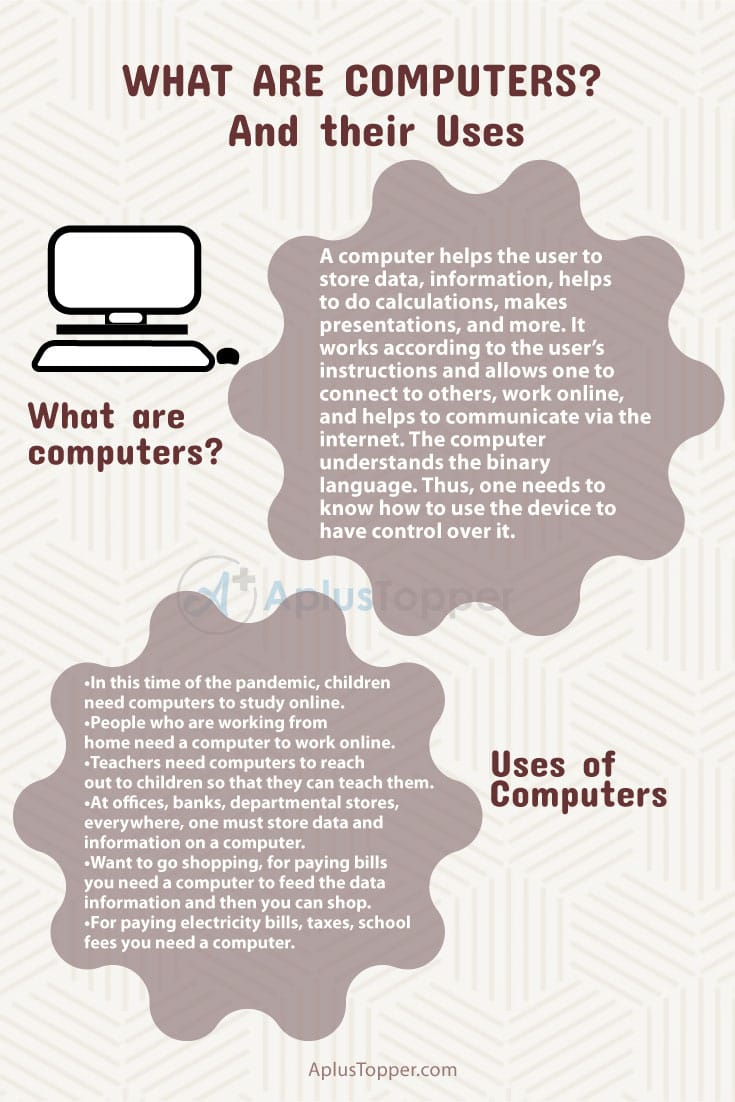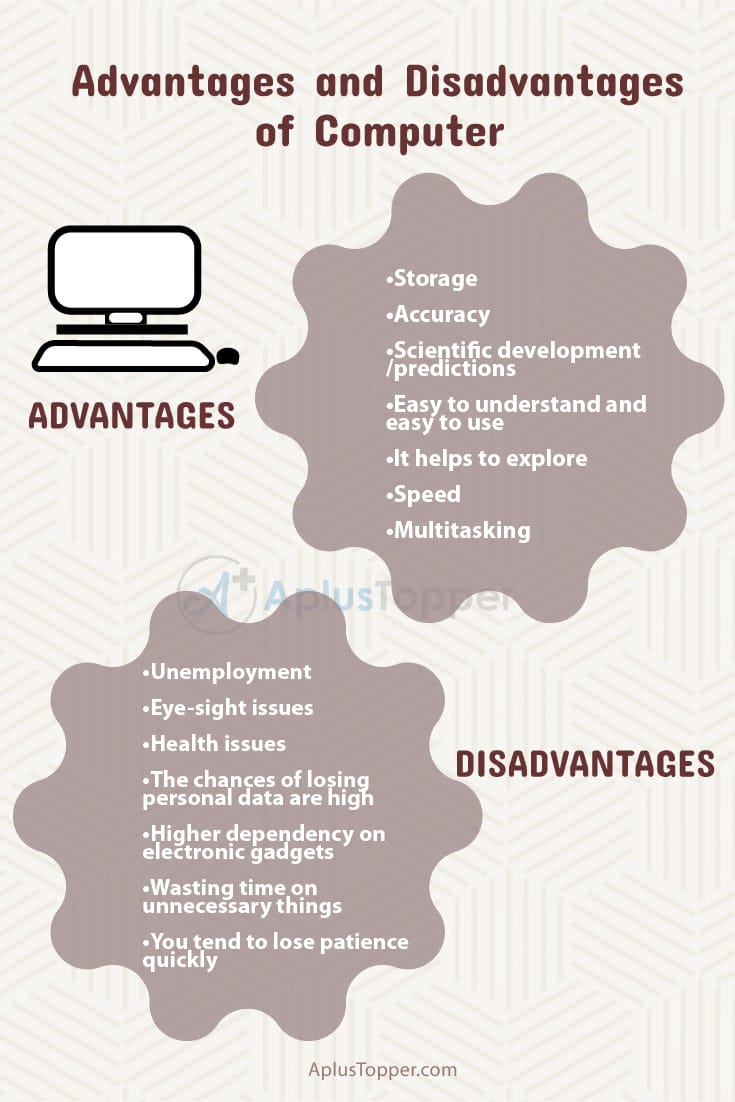Advantages and Disadvantages of Computer: Can you imagine your work, your life, and a world without technology? No, not at all. Today, without looking at your computer, you don’t even start your day. Without technology and without using a computer, life is not possible. With the changing times and technology, the computer has also changed. Though the computer is a man-made device, today, everyone is dependent on this device. The human brain cannot remember thousands of data and information thus, imagining a life without a computer is impossible. Did you know computers have passed five generations? Each generation of the computer has brought a new change to the world of computers.
Students can also find more Advantages and Disadvantages articles on events, persons, sports, technology, and many more.
What are Computers and their Uses?
A computer helps the user to store data, information, helps to do calculations, makes presentations, and more. It works according to the user’s instructions and allows one to connect to others, work online, and helps to communicate via the internet. The computer understands the binary language. Thus, one needs to know how to use the device to have control over it. Did you know Charles Babbage is known as the father of computing?
Uses of a Computer
Talking about the uses of a computer, there are numerous uses of this device, one must know how to use it. Today, a world without computers is next to impossible.
- In this time of the pandemic, children need computers to study online.
- People who are working from home need a computer to work online.
- Teachers need computers to reach out to children so that they can teach them.
- At offices, banks, departmental stores, everywhere, one must store data and information on a computer.
- Want to go shopping, for paying bills you need a computer to feed the data information and then you can shop.
- For paying electricity bills, taxes, school fees you need a computer.
- Banks need computers to store their clients’ data, their account information, credits, debits, loan transactions, and more.
The usage of a computer is endless. In short, we all are dependent on technology for everything.

Benefits of Using A Computer
Using a computer is very easy, anyone can learn it with practice. It is a beneficial electronic device and is a must.
- A computer helps you keep your documents, information, data organized.
- With one touch of a button, finding documents becomes easy. Thus it saves a lot of time.
- Working on a computer makes you assure that you are working with 100% accuracy.
- A computer keeps the user connected with the rest of the world.
- You are constantly updated with new technology and the latest information; thus, it keeps the user informed.
- It helps you work from anywhere and everywhere. You are not compelled to use it at a particular place as laptops, notepads, and comp-books are available.
Types Of Computers
With the changing time, computers have also evolved. There are different types of computers available in the market. Some have different configurations and features, and others have unique speed levels. Let us see the different types of Computers.
- Mainframe computers: these computers are costly and are generally used in huge organizations. More than one person can use the computer simultaneously at the same time. These computers are unique based on their structure and features. They are used in organizations that produce or work on bulk data like enterprise resource planning, consumer statistics, censuses, and more.
- Supercomputer: These computers are highly-priced as they can do trillions of calculations within a fraction of a second. They help reduce the work time. They are generally used for weather forecasting, in labs to know chemical reactions, molecular modeling, and oil or gas explorations.
- High-performance Workstation computers: these computers are designed for single users that work for scientific and engineering work that is computationally intensive. The CPU is powerful and is capable of storing a huge amount of data. Workstation computers use operating systems like UNIX, Windows NT and have a large amount of RAM.
- PC personal computers: a personal computer is designed with microprocessor technology. The whole CPU is composed of a chip. Computers used in offices, schools, shopping centers, businesses use this computer for maintaining the database, using word docs, running spreadsheets, doing accounting, and more.
- Minicomputer: is a small computer that allows 250 users to work at the same time. It has a multi-processing system like in notepads/notebooks, tablets PC, desktop minicomputers are all mini computers.

Advantages Of A Computer
- Storage: the most significant advantage of a computer is its storage capacity. A human brain cannot store everything as it tends to forget. Thus, with the help of a computer, we can get stored information with a touch of a button.
- Accuracy: a computer is never wrong. It is we who feed in the wrong information; thus, if you want 100% accuracy in your work and want to calculate millions of data, a computer can be beneficial. It gives error-free output without any chances of mistakes.
- Scientific development/predictions: computers are used by scientists for knowing the results of chemical reactions, for predicting the weather, space research, and other research work.
- Easy to understand and easy to use– doing tough calculations becomes very easy when you know the computer well. The results given by a computer are 100% true, and no one can doubt its efficiency. Step by step data processing and step-by-step calculations make one understand things in a much simpler way.
- It helps to explore: with the help of the internet, a computer allows you to explore the world. If you have any doubt, Google is there to help you and has all the answers to your difficult questions.
- Speed: no one can match up to the speed of a computer. Speed is related to the quantity of data, and the data is measured with a unit of time. As a computer is a fast device, it can process data rapidly. The speed of a computer is unmatchable and is measured in micro and nanoseconds.
- Multitasking: it can process data, store data, connects it to the internet, play games, watch videos, movies, songs, finds files in a few seconds, and more. A person can perform multiple tastes with the help of a computer. A computer can perform trillions of tasks within a few seconds; thus, it is a multitasking device.
Disadvantages of a Computer
A coin has two sides; thus, in the same way, a device has its advantages and a few disadvantages.
- Unemployment: you very well know a computer is capable of performing multiple functions. Thus, one of the disadvantages of a computer is unemployment. It does all the calculations, records data, processes information, thus creates unemployment. People do not prefer employing people; instead, they like doing all the work on a computer by themselves.
- Eye-sight issues: people who sit on the computer for long hours have an issue with eye-sight. A device sends out rays that are not suitable for the eyes; thus, people face visibility issues. A common problem that people face is carpal tunnel syndrome. This also occurs as working on a computer requires continuous eye movement from one sheet or page to another, leading to such issues.
- Health issues: sitting and working on a chair, sofa, couch for long hours can lead to health issues—pain in the shoulder, spinal cord pain, lower backache, and a lot more. Generally, people bend forward and work on the computer. Thus, this leads to a wrong sitting posture, further leading to health issues like slip discs, sciatica, and more. Movement of the hands continuously leads to injury in the fingers in the long run.
- The chances of losing personal data are high: people use the computer for almost everything and keep storing their data in it. There are chances that the personal information gets hacked or into the wrong hands. The hackers can use your information to access your bank account and professional account, which can be a risky affair.
- Higher dependency on electronic gadgets: when using a computer most of the time, there are chances that people tend to be dependent on it all the time. For example, you are writing an article, and you use the app Grammarly all the time to check spelling mistakes till will lead to making you dependent on the computer for everything. The chances of you learning from your mistakes will be less.
- Wasting time on unnecessary things: when using the computer with an internet connection, there are higher chances that your mind gets distracted all the time. You will not be able to concentrate on your work. You get bored quickly when you know there are other things you can do like hear a song, play games, or watch your favorite movie. All this leads to distracting the mind.
- You tend to lose patience quickly: when you know you have a computer to solve all your queries, and if it leaves any question unanswered, this will lead to frustration. Your patience level decreases which makes you angry now and then. This further leads to reducing your attention span.
Advantages And Disadvantages Of Computer In Tabular Form
| Advantages of Computers | Disadvantages of Computers |
|---|---|
| 1. Speed: Computers can process information at an incredibly fast rate, making tasks like data analysis and complex calculations much quicker and more efficient. | 1. Dependence: With the increasing reliance on computers, individuals and organizations may become overly dependent on them, which can lead to major problems if the computer systems fail or are compromised. |
| 2. Storage: Computers can store vast amounts of information in a relatively small amount of physical space, making it easier to manage and access data. | 2. Health Risks: Prolonged use of computers can lead to a variety of health problems, including eyestrain, headaches, and carpal tunnel syndrome. |
| 3. Automation: Computers can automate repetitive and mundane tasks, freeing up time and energy for more important work. | 3. Security Risks: The use of computers also poses significant security risks, as hackers and other malicious actors can exploit vulnerabilities in computer systems to steal data, launch attacks, or cause other types of harm. |
| 4. Communication: Computers make it easy to communicate with people all over the world, through email, instant messaging, and video conferencing. | 4. Cost: Computers can be expensive to purchase and maintain, particularly for individuals and small businesses. |
| 5. Accuracy: Computers can perform calculations and other tasks with a high degree of accuracy, reducing the risk of human error. | 5. Ethical Concerns: The increasing use of computers and artificial intelligence raises a variety of ethical concerns, such as privacy, bias, and job displacement. |
| 6. Efficiency: Computers can help streamline workflows and increase productivity, as they can perform tasks much faster than humans. | 6. Environmental Impact: The production and disposal of computers can have a significant environmental impact, as they require the use of natural resources and can generate electronic waste. |
| 7. Education: Computers can be used for educational purposes, such as online courses, research, and interactive learning activities. | 7. Distractions: The use of computers can also be a source of distractions, particularly for students and workers who may be tempted to surf the internet or play games instead of focusing on their work. |
| 8. Entertainment: Computers provide a wide range of entertainment options, from streaming movies and TV shows to playing video games. | 8. Privacy Concerns: The use of computers also raises privacy concerns, as personal information can be easily accessed or stolen if proper security measures are not in place. |
| 9. Accessibility: Computers can be adapted to meet the needs of individuals with disabilities, such as by using assistive technology or specialized software. | 9. Addiction: The use of computers can become addictive, leading to negative impacts on mental health and overall well-being. |
| 10. Innovation: Computers have led to a wide range of technological innovations, from the internet to artificial intelligence, that have transformed the way we live and work. | 10. Job Displacement: The increasing use of automation and artificial intelligence in the workplace has led to concerns about job displacement and the need for retraining and reskilling. |

